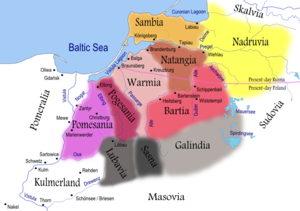Bartians

Bartians and other Prussian clans during the 13th century
|
|
| Total population | |
|---|---|
| Extinct in the 17–18th century | |
| Regions with significant populations | |
| Languages | |
| Old Prussian, later also German | |
| Religion | |
| Prussian mythology (Paganism) | |
| Related ethnic groups | |
| Other Prussians and Balts |
The Bartians (also Barthi, Barthoni, Bartens, or Barti) were an Old Prussian tribe who were among the last pagans of Europe before the Northern Crusades forced their conversion to Christianity. They lived in Bartia (also Bartenland or Barthonia), a territory that stretched from the middle and lower flow of Łyna river, by the Świna river, and Lake Mamry, up to the Galindian woods. The territory is quite precisely known from description in Chronicon terrae Prussiae, dated 1326.
The same description mentions two provinces, the Major Barta and the Minor Barta. The territory was quite densely populated, as confirmed by abundant archeological findings. Before the wars with the Teutonic Knights, the population was estimated to be at 17,000.
The Bartians, along with the other Prussians, were conquered by the Teutonic Knights, who Christianized them, brought in newcomers, and built many towns and cities. The Prussians assimilated with the newcomers and the Old Prussian language became extinct by the end of the 17th century.
Several years of conquest attempts by Poland, aided by a number of crusades by the popes and by Konrad of Masovia, had been fairly successfully repelled by the Prussians. Then Konrad of Masovia called for further crusades and invited the Teutonic Knights, an Order of the Catholic Church, to settle in Kulmerland in 1226. Receiving support from the rest of Christian Europe, the military order was able to expand their territory northwest. Their strategy was to conquer a territory and built a castle — a stronghold that would serve as the basis for further expansion. Castles at that time in Europe were built around towns to give their residents protection.
...
Wikipedia
